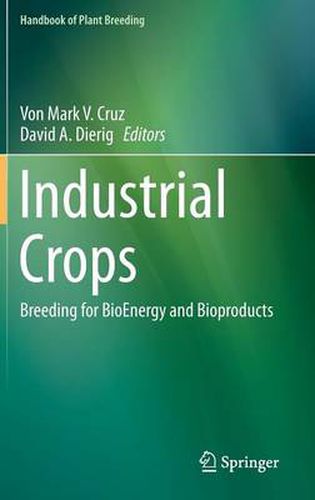Readings Newsletter
Become a Readings Member to make your shopping experience even easier.
Sign in or sign up for free!
You’re not far away from qualifying for FREE standard shipping within Australia
You’ve qualified for FREE standard shipping within Australia
The cart is loading…






This title is printed to order. This book may have been self-published. If so, we cannot guarantee the quality of the content. In the main most books will have gone through the editing process however some may not. We therefore suggest that you be aware of this before ordering this book. If in doubt check either the author or publisher’s details as we are unable to accept any returns unless they are faulty. Please contact us if you have any questions.
The volume on Industrial Crop Breeding will be part of the series, Handbook of Plant Breeding. This volume will focus on the emerging area of plant breeding for sustainable production of transportation fuels and bio based products using the current advances in the field. The book is scheduled to consist of a total number of 30 chapters divided into four sections. The sections will emphasize crops being considered for different challenge areas including oil crops for biodiesel; sugar, starch and cellulosic crops for biofuel; crops for bio products and issues and future prospects. A chapter introducing the first three sections will also be included. Outstanding scientists for each crop species are proposed as senior authors, who may invite co-authors to contribute part of a chapter to provide additional expertise or perspective. The proposed authors will represent various national and international institutions to get a more diverse view on the topic and somehow get a global view on the common issues that researchers on industrial crops are facing. The book will comprise primarily of specific issues, available germplasm, breeding techniques, and potential geographical areas of production pertaining to individual crops being considered for industrial uses. We hope to encourage the proposed authors of new crops to provide an estimate of the crop readiness for commercial development and discuss the limitations. This book will be will be of interest and envisioned to serve as an updated reference to researchers in both academic and industrial setting, to students and teachers of plant breeding and to policy makers who are looking for alternative solutions to dependency on imported petroleum products.
$9.00 standard shipping within Australia
FREE standard shipping within Australia for orders over $100.00
Express & International shipping calculated at checkout
This title is printed to order. This book may have been self-published. If so, we cannot guarantee the quality of the content. In the main most books will have gone through the editing process however some may not. We therefore suggest that you be aware of this before ordering this book. If in doubt check either the author or publisher’s details as we are unable to accept any returns unless they are faulty. Please contact us if you have any questions.
The volume on Industrial Crop Breeding will be part of the series, Handbook of Plant Breeding. This volume will focus on the emerging area of plant breeding for sustainable production of transportation fuels and bio based products using the current advances in the field. The book is scheduled to consist of a total number of 30 chapters divided into four sections. The sections will emphasize crops being considered for different challenge areas including oil crops for biodiesel; sugar, starch and cellulosic crops for biofuel; crops for bio products and issues and future prospects. A chapter introducing the first three sections will also be included. Outstanding scientists for each crop species are proposed as senior authors, who may invite co-authors to contribute part of a chapter to provide additional expertise or perspective. The proposed authors will represent various national and international institutions to get a more diverse view on the topic and somehow get a global view on the common issues that researchers on industrial crops are facing. The book will comprise primarily of specific issues, available germplasm, breeding techniques, and potential geographical areas of production pertaining to individual crops being considered for industrial uses. We hope to encourage the proposed authors of new crops to provide an estimate of the crop readiness for commercial development and discuss the limitations. This book will be will be of interest and envisioned to serve as an updated reference to researchers in both academic and industrial setting, to students and teachers of plant breeding and to policy makers who are looking for alternative solutions to dependency on imported petroleum products.